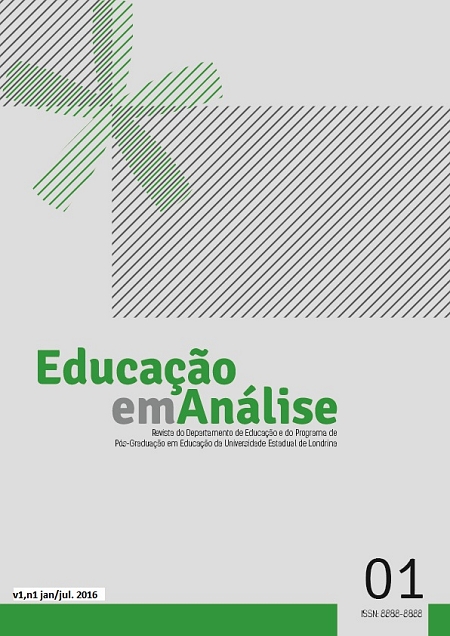"Philosophy teacher training for high school" - an analysis from data of reality supplied by teachers from Paraná
DOI:
https://doi.org/10.5433/1984-7939.2016v1n1p133Keywords:
Philosophy Education, High school, Teacher trainingAbstract
This paper analyzes the formation of the Philosophy teacher for high school from data obtained in response to a questionnaire given to a group of teachers who work especially in Londrina and region (NRL), including some belonging to a neighbor Regional Education Center. The text consists of two core parts, the first of which ruled on data provided by the Census 2011 of the state of Paraná, in which we can situate the philosophy teachers in the state, in Londrina and region. The second part presents the answers provided by philosophy professors from the questionnaire questions prepared for this purpose. All these data is analyzed in this study, having some of the authors important theoretical beacons in the comments, suggestions and final referrals of the text. We believe that, given the historic and input-output situation in the institutionalized Brazilian school environment, such a course currently requires professionals aware of the arguments on which they sustain their work. If Philosophy is present in the current school curriculum, it needs to be clear its proposal in the list of other disciplines, the problems it faces and possible ways forward. "Philosophy Teaching" then becomes an imperative issue to philosophers, especially the philosophers of education.
Downloads
References
MARSHALL, J. P. O professor e sua filosofia. São Paulo: Summus Editorial, 1977.
PARANÁ. Secretaria de Estado da Educação. Resultado do censo escolar 2011. Curitiba: Coordenação de Informações Educacionais, 2011.
NESEF - NÚCLEO DE ESTUDOS E PESQUISAS SOBRE O ENSINO DE FILOSOFIA. Posicionamento dos educadores e pesquisadores do coletivo do NESEF/UFPR sobre as declarações da SEED em relação ao resultado do IDEB do Paraná - 2012.
Downloads
Published
How to Cite
Issue
Section
License
Copyright (c) 2016 Educação em Análise

This work is licensed under a Creative Commons Attribution 4.0 International License.
Os artigos publicados na Revista Educação em Análise estão sob a Licença Creative Commons Atribuição 4.0 Internacional, garantindo Acesso Aberto. Deste modo, os autores mantêm os direitos autorais de seus trabalhos e, em caso de republicação, solicita-se que indiquem a primeira publicação nesta revista. Essa licença permite que qualquer pessoa leia, baixe, copie e compartilhe o conteúdo, desde que a devida citação seja feita. Além disso, autoriza a redistribuição, adaptação e criação de obras derivadas em qualquer formato ou meio, incluindo uso comercial, desde que a atribuição à revista seja mantida.
A revista se reserva o direito de efetuar, nos originais, alterações de ordem normativa, ortográfica e gramatical, com vistas a manter o padrão culto da língua e a credibilidade do veículo. Respeitará, no entanto, o estilo de escrever dos autores. Alterações, correções ou sugestões de ordem conceitual serão encaminhadas aos autores, quando necessário.
As opiniões emitidas pelos autores dos artigos são de sua exclusiva responsabilidade.
























